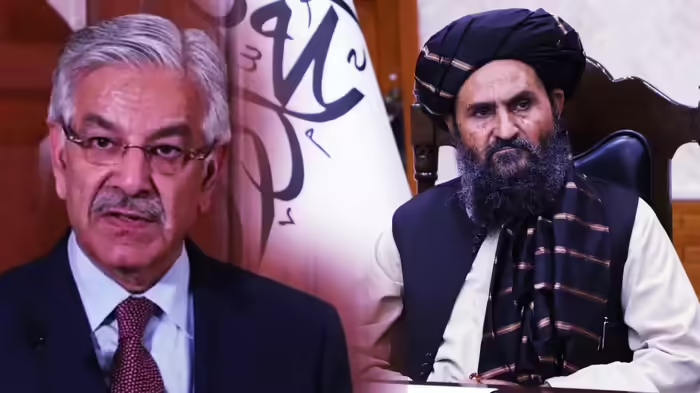
T
Islamabad/Kabul: Tensions between Pakistan and Afghanistan have escalated sharply as the Taliban government prepares to suspend trade through Pakistani territory, a move that could deliver a severe blow to Pakistan’s struggling economy. Afghanistan’s Deputy Prime Minister for Economic Affairs, Mullah Abdul Ghani Baradar, has directed traders and finance officials in Kabul to find alternative trade routes, claiming that Pakistan’s transit system has caused significant losses and market disruptions for Afghan businesses.
Following this statement, panic has begun spreading across Pakistan’s commercial sectors. However, Pakistan’s Defence Minister Khawaja Asif downplayed the development, saying the decision would have “no impact” on Pakistan. He even went on to call it a “blessing in disguise,” asserting that reduced trade would limit smuggling and infiltration across the border.
“The goods coming from across the border are not essential for us. Their markets don’t depend on our supplies. This move will, in fact, help curb terrorism entering Pakistan,” Asif claimed.
Traders Expose Government’s Claims
Asif’s statements were quickly dismissed by Pakistani business leaders, who warned that a trade freeze with Afghanistan would be disastrous for Pakistan’s economy. Former Senior Vice President of the Sarhad Chamber of Commerce and Industry, Engineer Manzoor Ilahi, told Dawn that Pakistan stands to lose far more than Afghanistan.
“Iran and India are already supplying Afghanistan with affordable medicines,” Ilahi said. “If Pakistan stops exports, Afghanistan can easily shift to India, Iran, or Central Asia. But for us, losing the Afghan market will cripple several industries.”
Baradar has reportedly given Afghan traders three months to terminate contracts with Pakistan and settle all pending accounts. He also instructed the Afghan Finance Ministry to halt the import of Pakistani pharmaceuticals, signaling a decisive shift away from economic dependence on Pakistan.
Afghanistan No Longer Needs Pakistan
According to Ilahi, Afghanistan’s trade diversification has already begun. “Uzbekistan and Russia supply sugar to Afghanistan, and Turkey and Iran have captured our market there. Afghanistan doesn’t need us — we need them,” he warned.
Vice President of the Pakistan-Afghanistan Joint Chamber of Commerce and Industry (PAJCCI), Zia-ul-Haq Sarhadi, revealed that over 8,000 trucks are stranded on both sides of the border due to recent closures, worsening the trade impasse.
Severe Economic Fallout Expected
PAJCCI’s Afghan chapter head, Khan Jan Alokozai, supported Baradar’s decision, calling his concerns “legitimate and long overdue.” He cautioned that if the situation persists, Pakistan will lose access to Central Asian markets, through which it exports 300,000–500,000 tonnes of potatoes each season.
According to Dawn, since the Taliban took power in Kabul in August 2021, Pakistan has already lost over 65% of its trade share in Afghanistan to competitors such as Iran, Turkey, India, and Central Asian nations.
Experts now warn that the Taliban’s latest move could further isolate Pakistan economically, undermine regional trade, and deepen the country’s ongoing financial crisis — a crisis already worsened by inflation, political turmoil, and declining exports.
Discover more from SD NEWS agency
Subscribe to get the latest posts sent to your email.
